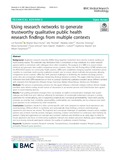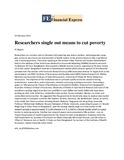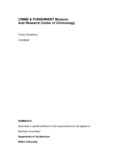Using research networks to generate trustworthy qualitative public health research findings from multiple contexts

View/
Date
2020-01-21Publisher
BMCAuthor
Nyirenda, LotKumar, Meghan Bruce
Theobald, Sally
Sarker, Malabika
Simwinga, Musonda
Kumwenda, Moses
Johnson, Cheryl
Hatzold, Karin
Corbett, Elizabeth L.
Sibanda, Euphemia
Taegtmeyer, Miriam
Metadata
Show full item recordCitation
Nyirenda, L., Kumar, M. B., Theobald, S., Sarker, M., Simwinga, M., Kumwenda, M., . . . Taegtmeyer, M. (2020). Using research networks to generate trustworthy qualitative public health research findings from multiple contexts. BMC Medical Research Methodology, 20(1) doi:10.1186/s12874-019-0895-5Abstract
Background: Qualitative research networks (QRNs) bring together researchers from diverse contexts working on
multi-country studies. The networks may themselves form a consortium or may contribute to a wider research
agenda within a consortium with colleagues from other disciplines. The purpose of a QRN is to ensure robust
methods and processes that enable comparisons across contexts. Under the Self-Testing Africa (STAR) initiative and
the REACHOUT project on community health systems, QRNs were established, bringing together researchers across
countries to coordinate multi-country qualitative research and to ensure robust methods and processes allowing
comparisons across contexts. QRNs face both practical challenges in facilitating this iterative exchange process
across sites and conceptual challenges interpreting findings between contexts. This paper distils key lessons and
reflections from both QRN experiences on how to conduct trustworthy qualitative research across different contexts
with examples from Bangladesh, Ethiopia, Kenya, Indonesia, Malawi, Mozambique, Zambia and Zimbabwe.
Methods: The process of generating evidence for this paper followed a thematic analysis method: themes initially
identified were refined during several rounds of discussions in an iterative process until final themes were agreed
upon in a joint learning process.
Results: Four guiding principles emerged from our analysis: a) explicit communication strategies that sustain
dialogue and build trust and collective reflexivity; b) translation of contextually embedded concepts; c) setting
parameters for contextualizing, and d) supporting empirical and conceptual generalisability. Under each guiding
principle, we describe how credibility, dependability, confirmability and transferability can be enhanced and share
good practices to be considered by other researchers.
Conclusions: Qualitative research is often context-specific with tools designed to explore local experiences and
understandings. Without efforts to synthesise and systematically share findings, common understandings,
experiences and lessons are missed. The logistical and conceptual challenges of qualitative research across multiple
partners and contexts must be actively managed, including a shared commitment to continuous ‘joint learning’ by
partners. Clarity and agreement on concepts and common methods and timelines at an early stage is critical to
ensure alignment and focus in intercountry qualitative research and analysis processes. Building good relationships
and trust among network participants enhance the quality of qualitative research findings.
Keywords
Qualitative research; Research networks; Trustworthiness; Generalisable research; Research guiding principles; Research good practicesDescription
This article was published in BMC Medical Research Methodology [ © The Author(s). 2020 Open Access This article is distributed under the terms of the Creative Commons Attribution 4.0 International License (http://creativecommons.org/licenses/by/4.0/).] and the definite version is available at: https://doi.org/10.1186/s12874-019-0895-5 The Journal's website is at: https://bmcmedresmethodol.biomedcentral.com/articles/10.1186/s12874-019-0895-5Department
Brac James P. Grant School of Public HealthType
Journal ArticleCollections
Related items
Showing items related by title, author, creator and subject.
-
Taking research to non-researchers: the case of a research compendium of BRAC
Ahmed, Hasan Shareef; Ullah, AKM Ahsan; Chowdhury, AMR (BRAC Research and Evaluation Division (RED), 1999-11)The study assessed the readership of Nirjash, a vernacular research compendium of BRAC. Since its inception in 1995, five issues have been produced. In 1998 we conducted a readership survey on its usefulness, accessibility, ... -
Researchers single out means to cut poverty
The Financial Express (The Financial Express, 2016-02-20) -
Crime & punishment museum and research center of criminology
Chowdhury, Turjoy (BRAC University, 2015-08)The project “Crime & Punishment Museum and Research Center of Criminology” aims to create a symbol of exemplary punishment for all kind of crimes that take place in our society. If we look at our society or nation, we ...



